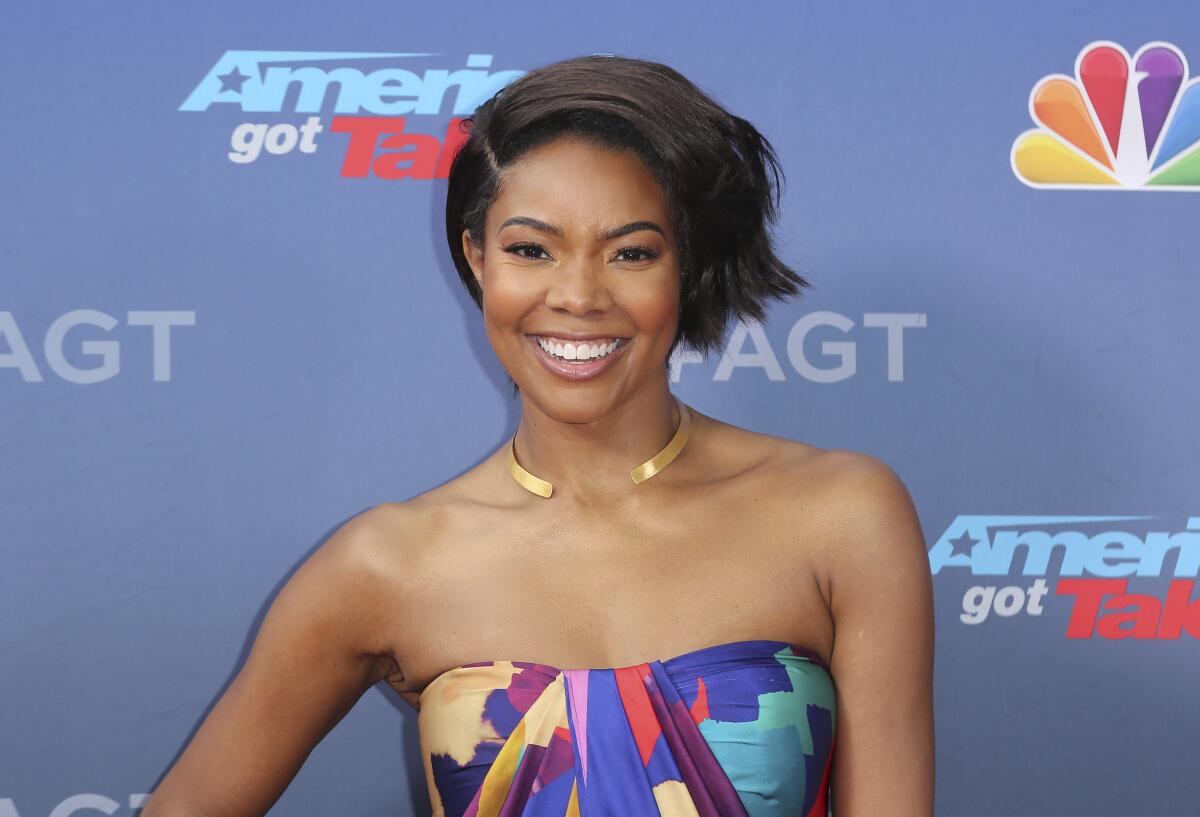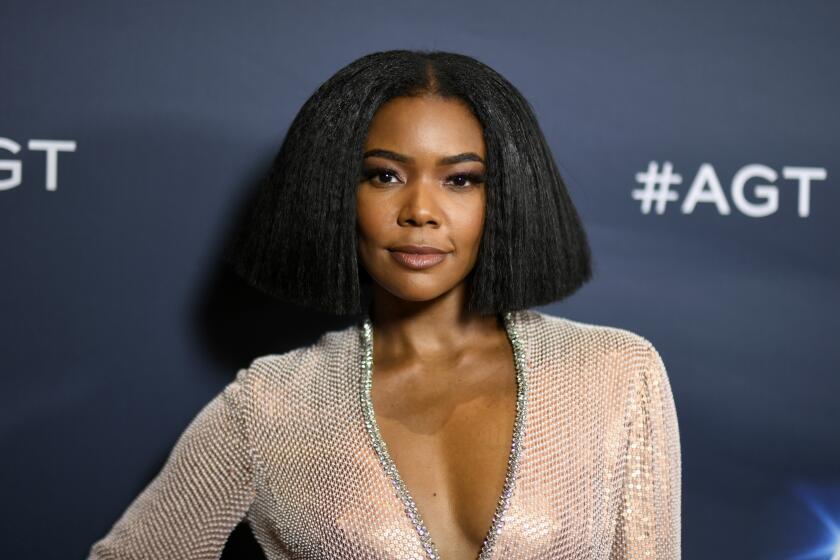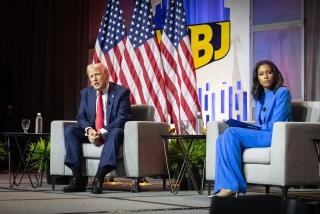This year, America faced a reckoning over race. It’s time reality TV had one too
- Share via
At first glance, ABC’s “The Bachelor” and CBS’ “Big Brother” are completely different. One is a fairy tale-flavored franchise where participants seek true love and happily-ever-afters. The other pits strangers cut off from the outside world against one another in a battle for a $500,000 grand prize.
But “The Bachelor,” its spinoff “The Bachelorette” and “Big Brother” share a common link: They’ve been rocked during their decades-long runs by charges of racism.
For the record:
12:20 p.m. Nov. 10, 2020A previous version of this article misquoted author Jennifer Pozner on this spring’s protest movement. She called it “the largest civil rights uprising” since the 1960s, not “the largest civil rights unrest.”
For much of its 18-year, 40-season run, “The Bachelor” franchise stood firm against repeated calls — and a contentious legal challenge — to feature a Black lead. Since its 2000 debut, “Big Brother” has regularly featured predominantly white casts, and Black houseguests have complained of being targeted and bullied.
Although “Survivor,” “America’s Got Talent,” “America’s Next Top Model” and other reality series have also come under fire for troubling racial dynamics, the “Bachelor” franchise and “Big Brother” have consistently drawn criticism for their handling of race, including from their own contestants. As recently as last season, “Big Brother’s” Kemi Fakunle publicly condemned “degrading and threatening comments” from her fellow houseguests, while Rachel Lindsay, who became “The Bachelorette’s” first Black lead in 2017, spoke out earlier this year about the series’ need for a “diversity makeover.”
“The Bachelorette” and “Big Brother” in recent months have had fresh opportunities to redeem their reputations, launching new seasons in the wake of massive civil rights protests over systemic racism and police brutality against unarmed Black men. They also offered a chance for ABC and CBS, which hurriedly issued statements of solidarity with Black Lives Matter following the police killing of George Floyd, to demonstrate their commitment.
But more diversity doesn’t automatically lead to better diversity, say scholars and others who have studied the genre, adding that “The Bachelorette” and “Big Brother” so far have done little to correct their troubled pasts. Increased representation has not yet led to more thoughtful consideration of the fiery and emotional racial dialogue fueled by a pandemic and a divisive presidential election. The failure, these experts maintain, undercuts the credibility of ABC and CBS on their pledges of solidarity.
A new social media campaign is calling on “The Bachelor” to diversify its casting and pledge it will be anti-racist.
“In the wake of the largest civil rights uprising since the 1960s, it is understandable that networks and showrunners of reality television would promise to do better,” said Jennifer Pozner, author of “Reality Bites Back: The Troubling Truth About Guilty Pleasure TV.” “But they still deliver the same kinds of misrepresentation and damaging tropes they’ve always delivered, sometimes in the same package and sometimes in new packaging.”
This season, “The Bachelorette” introduced close to a dozen suitors who were Black or nonwhite — the largest pool of people of color in the franchise’s history — seeking the affections of the show’s white lead, Clare Crawley. But the season was turned upside down when Crawley fell for former football player Dale Moss, who is biracial. The two grew closer, got engaged and exited the show. But while Crawley’s run resulted in an interracial relationship, producers left untouched any indication of the challenges such couples face. The season is being relaunched Tuesday with Crawley’s replacement, Tayshia Adams — the franchise’s second Black lead.
For its part, “Big Brother‘s” recently concluded “All Stars” edition, bringing back top players from previous seasons, was once again dominated by white contestants, and it featured a racially charged confrontation between a white houseguest with a history of violence and two Black female houseguests.
Kristen Warner, film and media studies associate professor at the University of Alabama’s journalism and creative media department, said producers of the shows simply want to add more people of color to their casts but not really acknowledge or deal with race meaningfully, because they feel “it’s such a weighty yoke and it’s not fun. They want to have their cake and eat it too.”
ABC and Warner Bros., which produces “The Bachelorette,” declined comment.
CBS, which has actively promoted a stream of pro-diversity initiatives in recent months, including a creative partnership with the National Assn. for the Advancement of Colored People, responded with a statement saying that this summer’s cast “was poised to be one of the most inclusive in the show’s history before COVID-19 significantly impacted the process.”
The heated dynamic of race in reality shows — and the accountability of producers to avoid or defuse racially charged scenarios — has been under a spotlight since late 2019, when actress Gabrielle Union filed a discrimination lawsuit against “America’s Got Talent” after leaving the show following one season as a judge. She and the network reached what was characterized in a joint statement as an “amicable resolution” earlier this year.
From Gabrielle Union on “America’s Got Talent” to an ejected “Survivor” contestant, the #MeToo era demands accountability from TV networks.
Though that scrutiny has only deepened since protests for racial justice swept across the nation, the subject appeared to be a nonissue in the first episodes of “The Bachelorette.” The effect of the heightened and emotional discourse about race on interracial relationships did not come up among the group of suitors pursuing Crawley, nor in their more intimate conversations with the Bachelorette herself.
Nor did the topic of race come up between Crawley and Moss, who has discussed in interviews the difficulties his Black father and white mother faced as an interracial couple, as well as challenges he encountered in his own dating life. And, as former lead Lindsay has said of her own interracial relationship on the show, such challenges are intensified by notoriety — leading, in Lindsay’s case, to “nasty messages” and “trolling” by fans.
Although “The Bachelor” franchise has traditionally favored rose-colored glasses, with the emphasis on idealized romantic love, Pozner, author of the upcoming media literacy graphic novel “Breaking (the) News,” called that focus disingenuous and unrealistic. She pointed out that the show in the past has dealt with issues such as addiction and personal trauma. Indeed, the outside world intruded on the series this season in the form of the COVID-19 pandemic, which affected production on “The Bachelorette” as well as “Big Brother”: Both series featured discussions about how contestants had to undergo testing before they were allowed to participate.

“It’s not too much to expect that any show that is supposed to be about people finding their life partner, especially if they’re pairing people in interracial relationships, would want to explore their values,” Pozner said. “If Clare or Dale or any of the other cast members discussed racism or discrimination in their lives, in their family or in the country, those discussions were left on the cutting room floor. And if those conversations didn’t happen organically, producers could have asked questions to elicit responses on those topics, as they do with a million other leading questions.”
Allegations of irresponsibility have shadowed “Big Brother” since its first season, when outspoken William “Mega” Collins, who is Black, became the first player evicted after several angry encounters with his mostly white costars over race.
The troubles this season, which concluded in late October, mostly revolved around houseguest Da’Vonne Rogers, who was open about her support of Black Lives Matter and her goal to be the show’s first African American winner.
“Twenty-one seasons of winners, and not one of those faces look like mine,” Rogers, who is an acting coach, said in one episode to her fellow houseguests. “Not seeing a face that looks like mine is very discouraging and hurtful, and it does make me think, ‘Maybe it’s not possible.’”
As “Big Brother” enters its Season 21 finale, the reality show’s history of contestants using racist language once again raises questions about CBS’ diversity push.
In the house with Rogers was fitness entrepreneur Christmas Abbott, who had first appeared on “Big Brother” in 2017. Abbott was arrested in 2018 after ramming her car into a vehicle belonging to the girlfriend of her child’s father. She pleaded guilty to misdemeanor criminal mischief and was ordered to complete an anger management class. (CBS declined to comment on the specifics of this season’s controversies, including why Abbott was cast again after her arrest.)
The most explosive moment of the season erupted when Rogers accused Abbott of betraying her friend Bayleigh Dayton and clearing the path for Dayton to be evicted. As Rogers got angrier, she became visibly distraught as she realized she might be perceived as the aggressor.
“Oh, God, oh, God, I hate this game,” Rogers said, crying as she paced around the back yard. “Why does she get to talk to me like that? But if I respond, they will look at me like I’m crazy... She talks to me like I’m her child, but if I respond, they will be, ‘That’s the Da’Vonne I was waiting for, that’s what I wanted her to do.’”
Moments later, Dayton, who is Black, started arguing with Abbott, and when Abbott became more aggressive, Dayton became more defensive. “If I did that, I would be labeled a ghetto-ass bitch,” Dayton said.
The network issued a statement that contestants’ behavior on the show was out of the control of producers. “At times, the Houseguests exhibit behavior and make comments that we don’t condone. However, there is absolutely no truth that the casting of the show is racially motivated, that the Houseguests’ behavior is predetermined or that the outcome is controlled in any way.”
But Catherine Squires, professor of communication studies at the University of Minnesota, said there is extensive behind-the-camera manipulation.
“It’s disingenuous [to say] there’s just a camera going and we’re watching things,” Squires said. “Racial antagonism has always been part of the narrative. Often, it seems like these producers are embracing the notion that we live in a ‘post-racial’ America to excuse exploiting racial tensions that are far from resolved.”
Added Warner: “These shows are casting people based on who they are and the conversations you have in interviews. The idea that the producers aren’t aware that these so-called conflicts are going to happen is disingenuous and creates a nice kind of plausible deniability.”
The continuing problems with race on “Big Brother” have started to turn off longtime fans like Thane Montgomery, an assistant editor at a firm that makes movie trailers and commercials. For more than a decade, Montgomery, who is white, has looked forward each summer to the arrival of the newest edition of the CBS series. But he is becoming increasingly disenchanted.
“Each season, the white people control the house and it gets boring,” he said. “It could be a really interesting show if the population of the house looked like the population of the country. But it seems like every season, CBS won’t make that happen. It’s like they don’t care.”
And, like the subject of racial justice in America itself, the subject of race on prominent reality franchises is not going to fade away.
Adams’ highly anticipated turn on “The Bachelorette” is sure to be closely watched, and “Big Brother” has already been renewed for its 23rd season, with the network saying in a statement that it “remain[s] committed to a more inclusive casting process and expanding diversity on the show.” (On Monday, after providing its statement for this story, CBS announced its commitment to 50% representation for Black, Indigenous and people of color on its unscripted programming by the 2021-22 season.)
Such commitments, along with the casting of Adams — the second Black lead in three years — and Matt James, the first Black male lead in “Bachelor” history, will offer these venerable properties yet another opportunity to move forward the conversation about race on reality TV.
But from some observers of the genre, there is already skepticism.
“Reality TV has pretended to reflect reality in America, but it has been feeding us toxic ideas about race and gender since 2000,” Pozner said. “You can’t trust a chef that has poisoned a restaurant to serve a delicious dinner that’s completely healthy when that chef still has access to all the poison in the kitchen.”
‘The Bachelorette’
Where: ABC
When: 8 p.m. Tuesday
Rating: TV-PG-DL (may be unsuitable for young children with advisories for suggestive dialogue and coarse language)
More to Read
The complete guide to home viewing
Get Screen Gab for everything about the TV shows and streaming movies everyone’s talking about.
You may occasionally receive promotional content from the Los Angeles Times.








